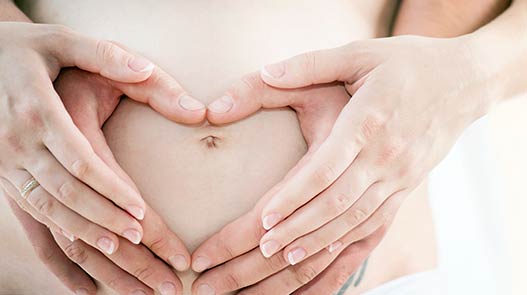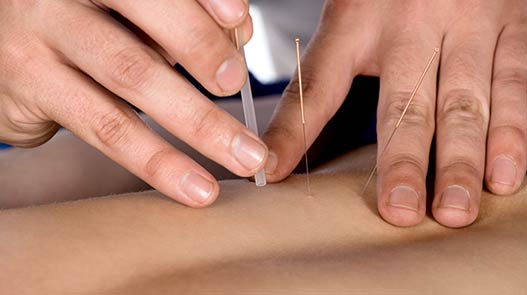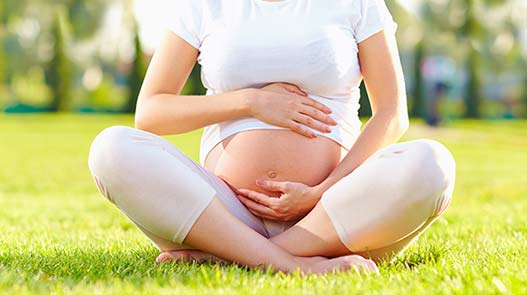
Numerous studies have confirmed the efficacy of acupuncture in treating infertility
A noted German study demonstrated that a test group receiving acupuncture in conjunction with IVF achieved a 42% clinical pregnancy rate, whereas the control group that did not receive acupuncture had a 26% pregnancy rate. This study utilized just a single acupuncture
session per patient, shortly before or after the transfer of embryos.
Another study demonstrated a 60% success rate when combining IVF with Chinese herbal medicine and acupuncture. Perhaps more importantly, both of these alternative modalities were found to significantly reduce the risk of miscarriage during the course of pregnancy.
One clinical study employing the use of ultrasound observed a marked shift in the color of womens’ ovaries from one that is cloudy to one of a clear hue after acupuncture treatment. Furthermore, the follicles were found to double in number, the lining of the uterus to thicken, and the number of embryos to increase. This test group experienced less side effects from Acupuncture treatments and more importantly, were more at ease.
Studies involving male patients have demonstrated a profound increase in semen quality and the amount of sperm produced following treatment with acupuncture and herbal medicine. Male patients receiving treatments from our clinic in particular, have reported positive, robust sexual benefits.
In 1999, clinical researchers reported that inserting acupuncture needles into specific body points triggers the production of endorphins. In another study, higher levels of endorphins were found in cerebrospinal fluid after patients underwent acupuncture. Endorphins have been shown to reduce anxiety. The production of endorphins also indirectly support strengthen reproductive organs.
The Benefits of Acupuncture and Chinese Herbal Medicine
*Improve the function of the ovaries to produce better quality eggs — Acupuncture and Chinese medicine help to improve ovarian function, allowing for the development of better quality eggs and strong, healthy embryos.
*Regulate the hormones to produce a larger number of follicles — Based upon clinical experience, Chinese medicine can help the ovaries at least double the number of follicles as well as significantly enhance the embryo’s quality and quantity.
*A number of previous studies have demonstrated that acupuncture does influence the activity of the autonomic nervous system. Proper balance of both branches of the Sympathetic and Parasympathetic nervous system is crucial for optimal functioning of reproductive organs, blood flow circulation, hormone balance, immune system, and regulation of the menstrual cycle.

*Acupuncture has been reported to promote the circulation of blood in the pelvic cavity and to improve ovarian function (Chang et al. 2000). Research indicates that increased blood flow to the uterus helps the development of follicles, the implantation of the embryo and increases the thickness of the uterine lining.
*Acupuncture has been shown to regulate hormone levels by moderating the release of beta-endorphin levels in the brain, which improves the releasing hormone by the hypothalamus, follicle stimulating hormone from the pituitary gland, and reproductive hormone levels from the ovary.
*Acupuncture has been speculated to moderate cyclooxygenase and prostaglandin levels in the uterus, reducing uterine motility to improve implantation rates.
*Relax the patient and reduce their stress — Many patients using IVF drugs experience side effects and high levels of stress associated with trying to get pregnant. Acupuncture treatments is extremely helpful in reducing stress and alleviating side effects, which helps the patient relax and be more at ease. Stress hormones such as catecholamines (adrenalin, noradrenalin, and dopamine) and hypothalamic-pituitary-adrenal axis interact with hormones which are responsible for normal ovulatory cycles. Furthermore, some hormones that are released during times of stress can cause the uterus to contract and negatively interact with immune cells, both of which will interfere with proper implantation (Gallinelli et al. 2001; Sher et al. 1998).
*Lessen the side effects of drugs used in IVF — Acupuncture and Chinese medicine can help the ovaries respond better to the stimulating drugs by producing more follicles and good equality eggs.
*Improve semen to create better quality and quantity of embryos — Sperm maturation is a process taking between 70-90 days. It is important for male patients to prepare for IVF during this period. It is beneficial that the male receive acupuncture and Chinese herbal medicine for at least three months prior to starting the IVF procedure. A recent trial published in Fertility and Sterility has shown how effective acupuncture can be in the treatment of infertility, leading to significant increases in the number of normal sperm and significant reductions in structural defects at the same time. Also, Chinese herbal medicine can help male patients improve the quality and quantity of sperm and the semen, too. In doing so, the health of the embryo improves and assists more secure implantation.
*Strengthen the immune system and decrease chances of miscarriage — Approximately half of chemical pregnancies result in miscarriage. Therefore, one of the key treatment strategies is to strengthen the patient’s immune system through Acupuncture and Chinese herbs. Once the embryo has been fertilized and implanted into the uterus, it is extremely important to prevent miscarriage with IVF patients. Female patients that are 40 years old or older, experience a miscarriage rate of nearly 50 % with IVF alone. However, with the help of Chinese medicine, the rate of miscarriage can be significantly reduced and the pregnancy can be supported to reach full term.
*While some patients respond to acupuncture quickly, acupuncture does not work overnight. Most patients require a series of ongoing treatments over one month to a year. The recommended treatment schedule is based upon consideration of a variety of factors in each individual case. In many cases, we recommend that the patient start acupuncture and Chinese herbal treatment at least 3-6 months prior to the commencement of the IVF cycle and the patient continue 2 times a week until the day of the transfer.

Acupuncture has numerous potential fertility-boosting benefits according to New York Weill Cornell physician-scientists
New York, NY(April 29, 2003)–physician-scientists at the center for reproductive medicine and infertility at New York Weill Cornell medical center call for a definitive study of acupuncture as a fertility treatment, citing its numerous, promising benefits associated with increasing fertility in women.
An article in a recent issue of Fertility and Sterility–co-authored by Dr. Zev Rosenwaks, Dr. Pak H. Chung, and Dr. Raymond Chang of Weill Cornell–provides a summary of current research that supports acupunctures potential benefits for fertility treatment, including the stimulation of increased uterine blood flow and fertility hormones.
“Acupuncture, which is nontoxic and relatively affordable, holds much promise as a complementary or alternative fertility treatment,” said Dr. Raymond Chang of New York Weill Cornell Medical Center. “Yet, while there are a great number of biological explanations for acupuncture benefits to fertility, as well as significant anecdotal evidence, there has yet to be a definitive clinical study,” added Dr. Rosenwaks, Director of CRMI.
“One of the biggest obstacles to any study of acupuncture is a single standard of care,” said Dr. Pak H. Chung of New York Weill Cornell Medical Center. “Only appropriate training and certification of acupuncture practitioners by state agencies can facilitate the integration of acupuncture into the treatment of female infertility, and health care in general.”
The lead review article reports that acupuncture treatment has the following potential fertility-boosting benefits:
*Increased blood flow to the uterus and therefore uterine wall thickness, an important marker for fertility
*Increased endorphin production, which, in turn, has been shown to effect the release of a reproductive hormones in regulating reproduction
*Lower stress hormones responsible for infertility
*Impact on plasma levels of the fertility hormones.
*Normalization of the hypothalamic-pituitary-ovarian axis, a key process in fertility
*A positive effect for women with polycystic ovarian syndrome, a hormonal imbalance present in three percent of adolescents and adults.
Acupuncture is the manipulation of thin metallic needles inserted into anatomically defined locations on the body to affect bodily function. These so-called acupoints correspond to areas on the surface of the body that have been shown to have greater electrical conductance due to the presence of a higher density of gap junctions along cell borders. A greater metabolic rate, temperature, and calcium ion concentration are also observed at these points.
Dr. Rosenwaks, Director of the Center for Reproductive Medicine and Infertility, and Dr. Chung treat infertility patients at Weill Cornell Medical Center at New York-Presbyterian Hospital. Dr. Rosenwaks is the Revlon Professor of Reproductive Medicine in Obstetrics and Gynecology, Co-Director of the Institute for Reproductive Medicine, and Attending Obstetrician and Gynecologist at Weill Cornell. Dr. Chung is Assistant Professor of Reproductive Medicine, Assistant Professor of Obstetrics and Gynecology, and Assistant Attending Obstetrician and Gynecologist at Weill Cornell. Dr. Chang is Clinical Assistant Professor of Medicine at Weill Cornell, where he teaches courses on alternative and complementary medicine. He is also affiliated with Meridian Medical.
